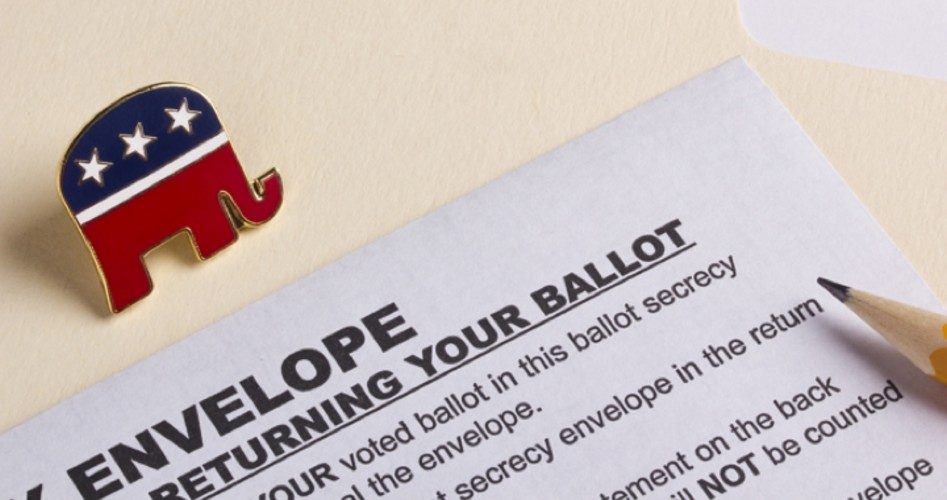
Former Republican lobbyist David Jolly prevailed in a March 12 special election in Florida’s 13th Congressional District, a swing district victory many political observers are calling a bellwether for the November mid-term elections. The prime issue of contention in the race between Jolly and Democrat Alex Sink was President Obama’s signature healthcare law, usually called “ObamaCare.”
Jolly is an establishment GOP favorite who prevailed with a plurality in a three-way GOP primary, and he will replace 42-year veteran Representative C.W. “Bill” Young, a Republican who died of cancer on October 18 last year. Young was reelected from the grave with 57 percent of the vote in the November election, while Jolly received a 49 percent to 46 percent victory over Democratic nominee Alex Sink. A libertarian candidate took the rest of the vote. Jolly’s victory comes despite the unappealing nature of the candidate. Josh Kraushaar of the National Journal reported on March 11 that “Jolly’s background was about as unfavorable as it gets — a Washington influence-peddler.” Jolly had been a Capitol Hill staffer and Washington, D.C. lobbyist who campaigned on establishment Republican issues that mirrored Mitt Romney’s unsuccessful presidential run: vaguely worded platitudes against spending, opposition to ObamaCare, and a strong affirmation of the military-industrial complex.
Jolly’s campaign website “issues” page posited that “Pinellas County and the Bay area are blessed to be home to the ‘national security triangle’ — a combination of active duty military and Coast Guard installations, veterans and industry. We must fight to maintain our local and regional military installations upon which so many jobs rely, and we must protect and grow the strong presence of defense, manufacturing and high technology jobs that ultimately provide for the security for our nation.” Other than an affirmation of the right to keep and bear arms, Jolly’s “issues” page was silent about civil liberties issues, such as surveillance of American citizens by the NSA.
Political observer Stuart Rothenberg labeled the Florida race “The Race Democrats Can’t Afford to Lose” in Roll Call magazine the day before the special election. Rothenberg wrote: “A loss in the competitive March 11 contest would almost certainly be regarded by dispassionate observers as a sign that President Barack Obama could constitute an albatross around the neck of his party’s nominees in November. And that could make it more difficult for Democratic candidates, campaign committees and interest groups to raise money and energize the grass roots. Fundamentally, the district, left vacant by the death of longtime Republican Rep. C.W. Bill Young, looks competitive but has a slight Democratic tinge. Barack Obama carried it 52 percent to 48 percent in 2008, but he had a more narrow victory four years later, when he won 50 percent to 49 percent.”
The slight edge described by Rothenberg has since been changed to slight Republican edge, based upon the fact that Obama won Florida — and the 13th district — by a slightly wider margin in 2008 and 2012 than Jolly’s victory March 12.
Jolly was outspent in the race, $5.4 million to $4.5 million, though he had support from independent establishment Republican organizations such as Karl Rove’s American Crossroads ($367,000), the National Republican Congressional Committee ($2 million), and the U.S. Chamber of Commerce ($1.2 million). Tea Party and Ron Paul-aligned liberty organizations sat the race out, since Jolly had little in common with those movements.
The Cook Political Report noted back in May 2013, “Midterm elections have always drawn older voters, and usually drawn white voters, to the polls in disproportionate numbers. Older voters are less transient, have grown deeper roots in their local communities, and pay much more attention to non-presidential elections than their younger counterparts. In the 1980s, that didn’t hold partisan consequences. Today, that amounts to a built-in midterm turnout advantage for Republicans.” (Emphasis original.)
Generally speaking, older voters and white voters — which have higher proportional turnout during mid-year elections — lean Republican. This factor is even more pronounced during special elections, which accounts for how former Massachusetts Senator Scott Brown won a special election in highly Democratic Massachusetts in a 2009 special election to replace Ted Kennedy. Senator Brown also had the advantage of running at the beginning of the Tea Party wave that overtook Congress in the 2010 elections. It’s unclear what impact the Tea Party movement will have on the 2014 races, though Tea Party-backed candidates are running in primaries across the nation.
Historically, the party occupying the White House takes a bath in the mid-term elections in the second term of any president. Democrats retook both Houses of Congress in 2006 under the last Bush mid-term election, and they took control of the U.S. Senate and made gains in the House in 1986 under Ronald Reagan. Democrats also posted huge gains in the post-Watergate 1974 election after the resignation of Richard Nixon. Likewise, Republicans gained significantly in 1950 under Harry Truman and in 1966 under Johnson. The exception was the 1998 elections under Bill Clinton, where there was no change in the U.S. Senate and a slight five-seat loss for Republicans under Newt Gingrich.
Does Florida’s 13th District portend bad luck for Democrats nationally in November? Time will tell.



